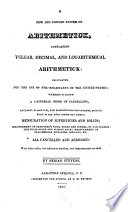 | Beriah Stevens - Arithmetic - 1822 - 436 pages
...: 4 : 8 : 16 : 32:64. In a geometrical progression, or series, five things occur to be considered ; any three of which being given, the other two may be found. The five things arc, 1. The least term. tc , o TU ... t Extremes. 2. 1 he greatest terms. $ 3. The... | |
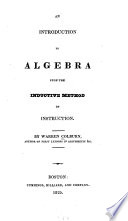 | Warren Colburn - Algebra - 1825 - 400 pages
...1 The two equations / = a -1, and S = contain all the relations of the five quantities a, 7, q, n, and -S; any three of which being given, the other two may be found. It would however be difficult to find n, without the aid of logarithms, which will be explained hereafter.... | |
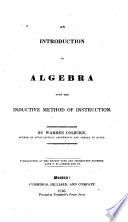 | Warren Colburn - Algebra - 1826 - 290 pages
...12, and n = 12. S-_ 12 (1 + 12) _ ?8 ^n,. 78 strokes. 2 This formula and the following X _n(a + I) contain five different things, viz. a, I, n, d, and...himself as occasion may require. Examples in Progression by Difference. 1. How many strokes do the clocks of Venice, which go on to 24 o'clock, strike in a... | |
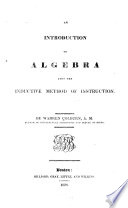 | Warren Colburn - Algebra - 1828 - 292 pages
...difference ; thus This formula and the following K _n(a + l) 2 ' contain five different things, viz. a, /, n, d, and S ; any three of which being given, the...himself as occasion may require. Examples in Progression by Difference. 1. How many strokes do the clocks of Venice, which go on to 24 o'clock, strike in a... | |
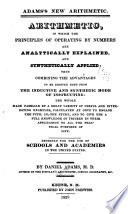 | Daniel Adams - Arithmetic - 1828 - 286 pages
...geometrical series. As in arithmetical, so also in geometrical progression, there are five things, any three of which being given, the other two may be found : — 1st. The first term. 2d. The last term. 3d. The number of terms. 4th. The ratio. 5th. The sum... | |
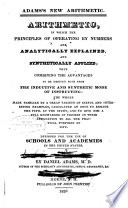 | Daniel Adams - Arithmetic - 1828 - 266 pages
...geometrical series. A§ in arithmetical, so also in geometrical progression, there are fire things, any three of which being given, the other two may be found : — 1st. The first term. 2d. The lust term. 3d. The number of terms. 4th. The ratio. 5th. The sum... | |
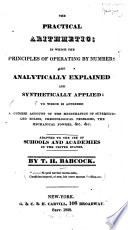 | Arithmetic - 1829 - 196 pages
...divisor is called the RATIO. 276. In geometrical, as in arithmetical progression, them are FIVE THINGS, any three of which being given, the other two may be found. 1st. The FIRST term. 2nd. The LAST term. 3d. The NUMBER of terms. 4th. The RATIO. 5th. The SUM OF ALL... | |
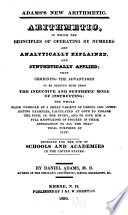 | Daniel Adams - Arithmetic - 1830 - 294 pages
...extremes, and the other terms are called the means. There are five things in arithmetical progression, any three of which being given, the other two may be found : — 1st. Theirs* term. 2d. The last term. 3d. The number of terms. 4th. The common difference. 5th.... | |
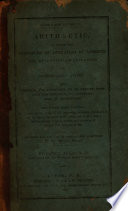 | Daniel Adams - Arithmetic - 1831 - 276 pages
...geometrical series. As in arithmetical, so also in geometrical progression, there are five things, any three of which being given, the other two may be found : — 1st. The/r*< term. 2d. The last term. 3d. The number of terms. 4th. Thereto. 5tn. The sum of... | |
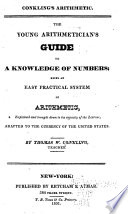 | Thomas Conkling (W.) - Arithmetic - 1831 - 302 pages
...the first term, the last term, the number of terms, the common difference, and the sum of all terms; any three of which being given, the other two may be found. Case 1st. When the first term, the number of terms, and the common difference are given. to find the... | |
| |